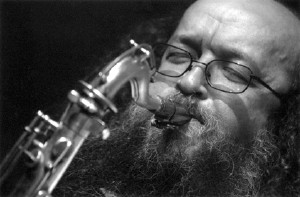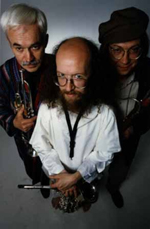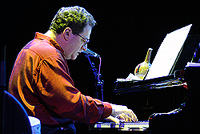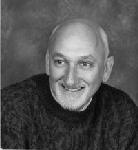Red & Hot: The Fate of New Jazz in Russia

Sergey Letov
by Mikhail Mitropolsky
(June 2011)
Any serious jazz follower remembers a brilliant book by Frederick Starr entitled Red & Hot; The Fate of Jazz in the USSR. However, the book finishes just at the time when so called "new jazz," "free jazz," "new music" was emerging in the USSR. Zoom one quarter of a century forward and the USSR does not exist anymore. Having lost 17 republics and about 100 million people, it's been reduced to Russia. But what happened to music? Moscow jazz commentator and broadcaster Mikhail Mitropolsky throws some light on the subject.
Part 1
All of a sudden one understands that NEW JAZZ, NEW MUSIC, FREE JAZZ is not so new anymore. This is what John Zorn said in one of his interviews in the beginning of the 21st century: "Free jazz is not avant-garde, this music is 40 years old. During the '60s when I was 16-17 years old free jazz was new while Dixieland was 40 years old. Those who listened to Dixieland we used to call "moldy figs." Now the music that is 40 years old is "free jazz," and those who deal with this music are moldy figs. One has to understand that avant-garde or experimental music is not a sound or style. This is the way to look at the world, this is the way of life. And this way is constantly changing."
In 1999, Leo Feigin of Leo Records started a new label "Golden Years of New Jazz" with the idea of documenting past achievements of new jazz. He started the label exactly because new jazz was not new anymore. It was 40 years old and it was the music of the past.
The interest in new jazz in the USSR emerged in the '70's. Politically, it was a "stagnation period" and some creativity was possible in places situated far away from centralized power. Faster than anywhere else, new jazz was developing in Lithuania. In the capital, pianist Vyacheslav Ganelin and the drummer Vladimir Tarasov met up. Some time later, they persuaded the saxophone player Vladimir Chekasin to move to Vilnius from the Urals. This was happening at the very end of the '60's and a couple of years later, this all-new Soviet jazz was heavily influenced by the music of the Ganelin Trio. Saxophonist Anatoly Vapirov and pianist Sergey Kurypkhin were active in Leningrad, saxophonist Vladimir Rezitsky put together Jazz Group Arkhangelsk, which later became legendary in the northern city of Arkhangelsk, and pianist/composer Yuri Yukechev and saxophonist Vladimir Tolkachev created the ensemble Homo Liber in the Siberian city of Novosibirsk.
Saxophonist Sergey Letov:
"Interesting that the avant-garde musicians of different persuasions were friendly to each other. They used to go to the unofficial art exhibitions and art studios of the underground artists, and the artists used to go the underground music concerts. When I started playing new jazz, I immediately found myself among new people. I met Alfred Schnitke, Edison Denisov, Sofia Gubaidullina, Alexey Lubimov, Anatoly Grindenko. I got friendly with avant-garde artists, (like) the future heroes of the 'buldozer exhibition' in the South-West Moscow. Musicians, poets, writers used to gather in the studios of Yuri Kuper, Ilya Kabakov, Alexander Bloch and other artists. They listened to the underground recordings, exchanged 'samizdat' literature. Avant-garde music was a normal, natural event, easily understood."
The enthusiasm of the pioneers of new-jazz movement was so great, and the total inability of the apparatchiks to understand what was going on was so obvious that it became possible to promote meetings and festivals of new jazz on a reasonably high level away from Moscow. Such conferences were organized in Novosibirsk, Tallin and Leningrad.
The end of the '70's and the beginning of the '80's were marked by emergence of new musicians who were trying to find new ways of self-expression: the duo Guyvoronsky/Volkov in Leningrad, Vladislav Makarov in Smolensk, the Gypsy singer Valentina Ponomareva in Moscow. Also in Moscow saxophonist Sergey Letov, French hornist Arkady Shilkloper, and tubist/vocalist Arkady Kirichenko formed the trio "TRI-O." In Moldova there emerged ethno-jazz ensemble "Kvarta" and pianist Misha Alperin who later became a recording artist for the German ECM label.

Tri-O
During the '80's, there begins the division of the jazz scene into mainstream and new jazz. Traditionalists aggressively proclaimed new jazz to be a paranoiac nightmare and the musicians practicing this kind of music to be charlatans while avant-gardists were not as militant. It is with this kind of baggage the Soviet jazz came to "Perestroika," which was promising a much-desired freedom of expression. Perestroika Western producers who fell for the bait of "Glasnost, Perestroika, Gorbachev" supported the euphoria that spread to jazz as well. Many Russian musicians from both camps fled the country to seek their musical happiness in the West — the business-like representatives of mainstream Igor Butman and Ivanov's brothers and the representatives of new jazz Vyacheslav Ganelin and Misha Alperin who did not trust "perestroika" to bring any changes.
However, "perestroika" did bring new opportunities. By mid-'80's, Sergey Kuryokhin's Pop-Mechanika was in full swing and he was taking his creation to some European festivals.The Leningrad-based Kuryokhin was considered to be the whiz-kid of new music. In mid-'80's, Moscow responded by creating "Moscow Composers Orchestra" which embraced the improvising elite of Russian new music.
It seemed that freedom brought long-awaited success to new jazz--the real parade of new music took place in Zurich at the six-day festival of Soviet avant-garde jazz in 1989.The line-up of the festival read as who's who in Soviet new music: Ganelin solo and in duo, Guyvoronsky/Volkov duo, Chekasin's quartet, Vapirov's big-band, the quartet "Snow Children" from Siberia, Aziza Musrafa-Zade from Azerbaijan, Valentina Ponomareva from Moscow, TRI-O, Misha Alperin solo and in duo with Arkady Shilkloper, Jazz Group Arkhangelsk, Anatoly Varipov trio with Vladimir Tarasov. The only absentee was Sergey Kuryokhin. The festival was documented and released by Leo Records in 1991 as a 4-CD boxed set entitled Conspiracy - Soviet Jazz Festival, Zurich 1989. A year earlier, Leo Records released an 8-CD boxed set Document - New Music from Russia, the '80s. The set contained over 10 hours of music and happened to be the monument to the most productive period in the development of Soviet avant-garde. The culmination point of the period was a series of 10 films entitled New Music from Russia, presented by the producer of Leo Records, Leo Feigin himself. The series was shown by British Channel-4 television and was running every Saturday for over two months to great critical acclaim. Post-Perestroika The wave of euphoria and the interest which the West was showing to the Russian avant-guardists subsided quite quickly. It took roughly under 10 years.
During this time, the structure of jazz movement and the system of priorities in Russian jazz went through considerable changes. Several jazz clans that had been forming during this time divided the jazz commercial market into parts. The jazz market became completely oriented to the creation of a commercial product. In the past, the whole system of promoting jazz depended on individuals for whom jazz was a labour of love but the newly acquire freedom changed everything. It became of primary importance for musicians to sell their art. The main principles became simplicity, accessibility, advertising and the desire to please the paying audience. This battle for the audience became especially noticeable in Moscow, the city of nouveau riches.
It became clear that when everything is allowed, many things are not needed. As soon as the social function of jazz disappeared, as soon as the musical side of jazz was left naked, the audience was leaving jazz in great numbers. Jazz was quickly moving towards mere entertainment. It was not a music of protest anymore- it was a music of comfort for which nouveau riches were ready to pay good money. Experiments, creativity and originality were becoming a thing of the past. The fate of new jazz after Perestroika After the break up of the Soviet Union, the myth about "Soviet new music" was evaporating not only because political interest in the USSR was subsiding but also because myth-creating musicians were disappearing from the stage. Mikhail Alperin moved to Norway, Anatoly Vapirov went to Bolgaria, Slava Ganelin moved to Israel, Sergey Kuryokhin died. Pyatras Vishnyauskas and Vladimir Tarasov became citizens of Lithuania, Arkady Shilkloper spends most of his time in Germany. One of the first to leave was the Tuvan singer Sainkho Namchylak, who settled in Austria.
Andrey Solovyev is a musician, philosopher and publicist from Moscow. This is what he says about special features of new music in Russia:
"The big paradox in the history of Russian avant-garde jazz is that many traditional signposts happened to be moved: if avant-garde musicians of the entire world were seeking alternative ways of expression to protest against the values of the bourgeois world and consumer society, for Russian musicians it was the way into the bourgeois values and Western way of life. It was a try to acquire the values of European civilisation".However, in the history of new jazz in Russia, there are personalities who, having died, closed the door to the entire style of music which they represented. The death of Sergey Kuryokhin in 1996 was the end of romantic and extreme post-modernism. The whole polystylistic layer of music disappeared with the death of the saxophonist and leader of the "Jazz Group Arkhangelsk" Vladimir Rezitsky in 2001. He was the soul of many jazz festivals in the North of Russia. Personalities of new jazz in Russia today Probably the most powerful creative impulse comes from two outstanding musicians from St. Petersburg- Vyacheslav Guyvoronsky (trumpet) and Vladimir Volkov (bass). Guyvoronsky is not only a trumpet player. He is a composer and conductor and his musical activity covers a huge field from Bach to avant-garde. Having started playing in duo with Guyvoronsky, Vladimir Volkov takes part in a colossal amount of projects: Volkovtrio, ensembles with Vladimir Tarasov, Andrei Kondakov, Arkady Shilkloper, Mola Silla, Ned Rothenberg, Sainkho Namchylak, Kazutoku Umezy. One of the CDs released by Guyvoronsky/Kondakov/Volkov trio (Christmas Concert, Leo Records, CD LR 520) was nominated as the best album of 2009 by the New-York's AllAboutJazz.
Another trio, TRI-O, also has a Soviet past. It's been active for some 25 years. This trio leans towards a post-modern aesthetic with elements of parody and free jazz. The most active participant of TRI-O, saxophonist Sergey Letov, played with an incredible number of musicians from Sergey Kuryokhin to Matthew Shipp, and composed music for cinema and theatre.
Still active is The Moscow Composers Orchestra which was born before Perestroika. This band is a strange congregation of Russian and non-Russian musicians and the leader of the band is the British piano player Vladimir Miller. French hornist Arkady Shilkloper leads many unorthodox projects, although his projects are closer to what the Swiss musician John Wolf Brennan calls 'comprovisation,' i.e. a synthesis of composition and improvisation.

Andrei Razin
The same line is being followed by piano player and composer Andrei Razin, who is the leader of the trio "Second Approach." The other members of the trio are the vocalist Tatiana Komova and bass player Igor Ivanushkin. Very often, the trio invites guests such as Arkady Shilkloper, Ukranian saxophone player Yuri Yaremchuk, German drummer Klaus Kugel and American trombone player Rosewell Rudd. This trio is the most stable Russian project which sticks to the idea of comprovisation, using original music. This trio uses elements of folklore, academic avant-garde and music theatre and they can really swing. It started in 1998 and since then performed at festivals in Russia, Lithuania, USA, Poland, Germany, Finland, Norway and Israel. The discography of the trio counts at least 10 CD's and their last release, Event Space (Leo Records, 2010), was mentioned among the best CD's of 2010. In Ekaterinburg, which is situated just beyond the border separating Europe from Asia, lives the trumpet player Sergey Pron. He represents the typical branch of European jazz. Among his partners were Arkady Shilkloper, Louis Sclavis, Werner Ludi, Anatoly Vapirov and Vyacheslav Ganelin. Pron is also a member of the Moscow Composers Orchestra.
There is one musician who can compete with Sergey Letov in terms of quantity of projects of spontaneous music making. He is a composer, teacher, and pianist Roman Stolyar from Novosibirsk. He collaborated with Letov and Vladimir Chekasin, Vladislav Makarov and Anatoly Vapirov, Vinny Golia and Dominic Duval. He also wrote a book entitled Contemporary improvisation. Roman Stolyar belongs to a younger generation whose vision of improvised music differs from the ideas of the older generation. To this category of younger musicians belongs an accordionist and vocalist Evelyn Petrova from St. Petersburg. She is a conservatoire graduate who became famous due to performances with Vyacheslav Guyvoronsky who introduced her to jazz improvisation and the aesthetic of new music.
Evelyn Petrova is a rising star of European new music. Having released an album Year's Cycle she performed solo at festivals in Holland, Belgium, France, U.K. and Germany. She also performs in a duo with the British violinist Alexander Balanesku. One more important personality of new music is a 30-year old saxophonist Alexey Kruglov. He is closer to jazz than all of the above mentioned musicians, he got a good jazz education and won a lot of awards for young musicians. Having grown up however, he rebelled against jazz conservatism and turned his "Kruglyi Band" into an experimental laboratory to create not only musical compositions but large pieces based on music and literature. The line up of Kruglyi Band is constantly changing and Alexey unites forces with the drummer Oleg Udanov, Vyacheslav Ganelin, Vladimir Tarasov and the trio Second Approach. The latest CD by Alexey Kruglov Russian Metaphor got the highest marks in the British jazz magazine Jazzwise and the young Russian musician was proclaimed to be a genius. During the last several years, there appeared several new names which give hope that connection between the generations won't be broken- pianist and producer Alexey Lapin, saxophonist Ilya Belorukov from St. Petersburg, pianist Alexey Chernakov from Moscow.

Leo Feigin